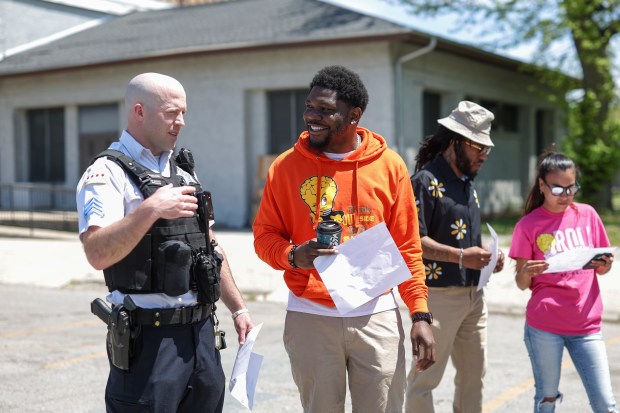For a city with hundreds of shootings each year, the work that Pha’Tal Perkins does with kids in Chicago is quiet but significant.
Perkins, 41, remembers that after a bullet went through a window and into the neck of an 11-year-old girl last year in the West Englewood neighborhood, for example, he spent long hours bringing food and making sure her mother and 16-year-old brother felt safe leaving the house.
He talked through her treatment with them as she recovered, and as the girl’s brother had been out of school, he helped him re-enroll. Perkins coaches his team of outreach workers to take similar approaches with other families in crisis.
“(We) once (were) a part of that street lifestyle,” he said. “But because (we) show them love and care, they respond with respect.”
His team of workers does round-the-clock work to tackle the root causes of community violence, leading peer-to-peer support and group therapy sessions. They help kids apply for college and jobs, and host programming for kids. They are often the first to crime scenes, even before police.
In late April, due to the end of a federal grant that supported many of those efforts, Perkins had to lay off five of the outreach staff at his violence intervention nonprofit, Think Outside Da Block. His organization isn’t the only one that received cuts, and he said there will be half the number of people this summer out in the community mediating conflicts.
Gutting that infrastructure could have a ripple effect, Perkins said, as Chicago law enforcement relies on groups like his to keep the city safer. The impact, according to Perkins, could mean fewer conflicts resolved and more shootings.
‘You’re retraumatizing people’
On April 22, Metropolitan Peace Initiatives, a nonprofit organization in Chicago that supports Perkins’ nonprofit along with several others, received an email from the U.S. Department of Justice that one of its federal grants was canceled.
In step with several strategies that President Donald Trump has used to cut or defund programs and grants that don’t align with the administration’s political values, the award was cut because it “no longer effectuates the program goals or agency priorities,” the email stated.
The total money comes out to about $3.7 million for the next three fiscal years, according to Vaughn Bryant, the executive director of MPI. Three organizations like Perkins’ received cuts that took effect right away, he said.
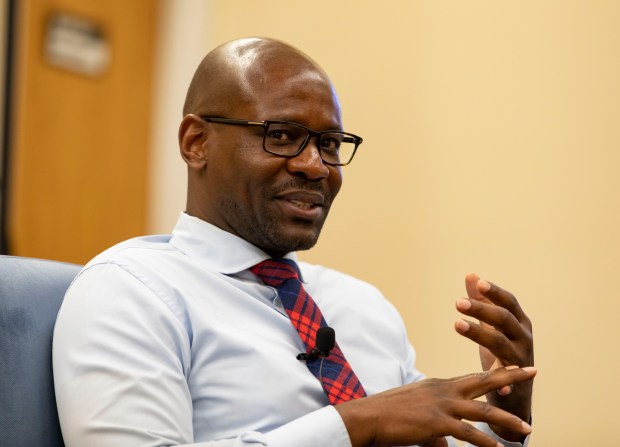
Bryant said MPI viewed those grants as a way to put money into the community and let people like Perkins build from there.
“Continuity of services matters,” he said. “You’re retraumatizing people.”
Perkins
Growing up in the Englewood neighborhood, Perkins said a pair of Nike Jordans was unheard of because his working mom only had enough to make sure the lights were on and the mortgage paid.
“My peers made me feel like what I had wasn’t enough,” he said. “In an environment where people make fun of you and you might not be invited to certain things, or you can’t sit at this table, you feel left out.”
Desperation drove him into yearslong cycles of stealing and crime, he said.
Those decisions swallowed him up, he said, until his daughter Patience was born eight years ago. He was at the hospital and had to leave for court, he said. It shifted his thinking.
“There’s only two ways out of this — dead or jail,” he remembers thinking at the time. “This ain’t it.”
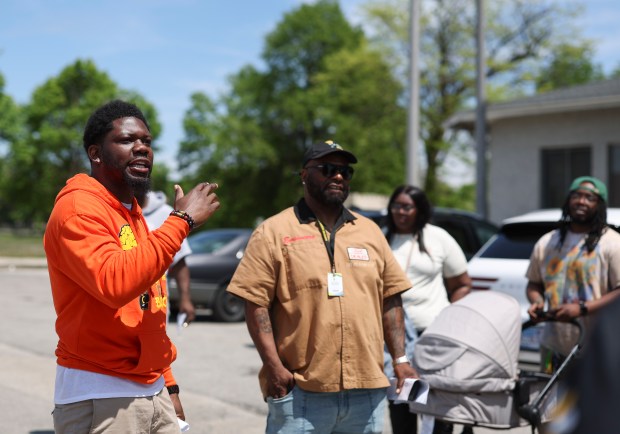
Relying on his relationships with community members, he carefully built Think Outside Da Block from the ground up.
He’s known many of the people he works with for his whole life. They, like him, know what triggers kids and how to calm them down.
“It’s the things that you don’t see. The things that you can’t measure,” he said.
Pha Day
On April 24, Perkins was in his office getting ready to celebrate what he calls “Pha Day,” or the anniversary of the city’s official recognition of his nonprofit.
He and his team were planning several events, including providing snacks, T-shirts and games to students at Simeon Career Academy in the Chatham neighborhood during lunch.
“Everybody is in celebration mode, and then I get this news that I have to lay off more than half of my outreach team,” he said.
He was worried about what it might mean for the homicide rate, which was going down in his community, partially, he said, due to violence intervention. There were 45 fewer people killed in total homicides last year when compared with 2023, and the West Englewood neighborhood had 15 fewer shootings, according to Tribune data.
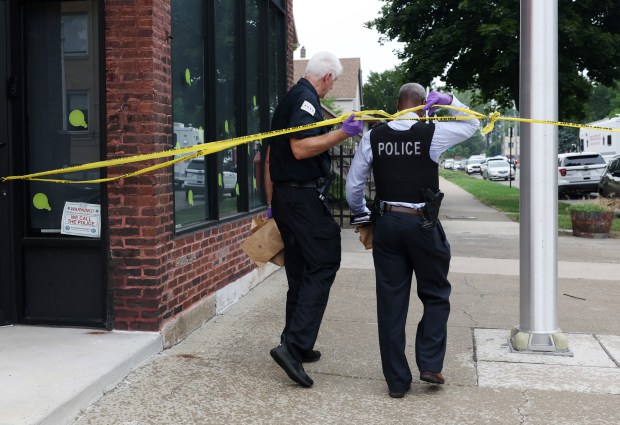
Chicago violence is concentrated in the summer. If there is an uptick, Perkins is concerned that families could now be left without assistance for funeral planning or grief counseling.
But immediately, he had to break the news to his team members, who would now be left to figure out their lives and find ways to pay their bills. Many of the outreach workers are formerly incarcerated or have had trouble finding sustainable employment.
“Does this mean that if it gets too hard, they might go back to living the street lifestyle, or go back to what they knew previously?” he asked.
Perkins waited days before telling his team, which he said was “one of the hardest things he’s had to do.”
Violence intervention is a calling for the members of Perkins’ team, said Jordan Little, 35, who joined the nonprofit about a year ago but found out late last month that he was being laid off.
Little said he started doing the work four years ago after he was caught in the crossfire of a shooting in the Pullman neighborhood. He ran to a gas station and was brought to the hospital, where he stayed for a week. It took him over a month to rehabilitate.
It’s experiences like those that he said make him better at responding in crisis situations. But for the moment, instead of engaging in the work he loves most, he’s selling life insurance and looking for something more stable.
“The cuts will just bring more scarcity, and people may start to turn on each other,” Little said.
‘The best of our ability’
With a shell of its staff remaining, the remaining outreach workers at Think Outside Da Block are moving forward. They’re hosting workshops for teens who have been in and out of jail and planning nighttime events to keep kids engaged.
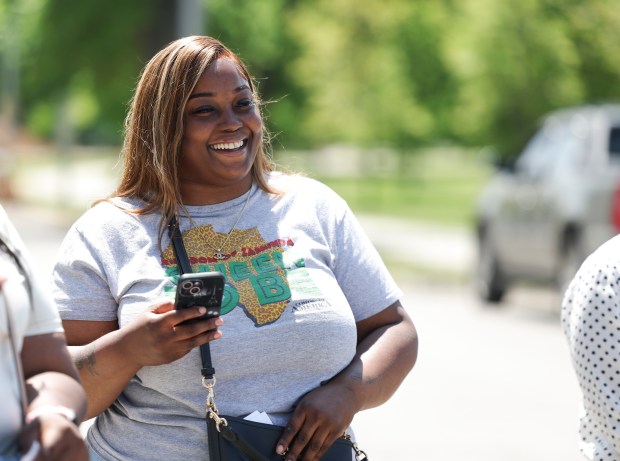
LaMarcus Brock, a case manager who works with Perkins, said that at a difficult time for the organization, he is focusing on the work. He’s looking forward to prom season and graduations with his students.
“They need us,” he said.
On a recent afternoon in the Ogden Park field house in Englewood, Perkins led a group of volunteers around the park to plan for their upcoming “Roll N Peace” event in mid-June, where they give out 100 bikes and encourage people to ride at night.
It works, said Unoka Obanner, a case manager with Think Outside Da Block. She is a single mother of four boys, and said her kids go to all of the events that Perkins holds in the community. Her boys also came out for Perkins’ Unity Day event to help clean up Englewood.
“Pha’Tal helps make it peaceful,” she said. “He steps up in every type of way.”
Obanner said she is close friends with several of the staffers who were let go. She saw how hard it was for Perkins to break the news to them.
“Many of those people have families. They have responsibilities. This is something they were relying on,” she said.
But mostly, she’s worried about the effect it will have on summer rates of violence.
“I’m afraid,” she said.
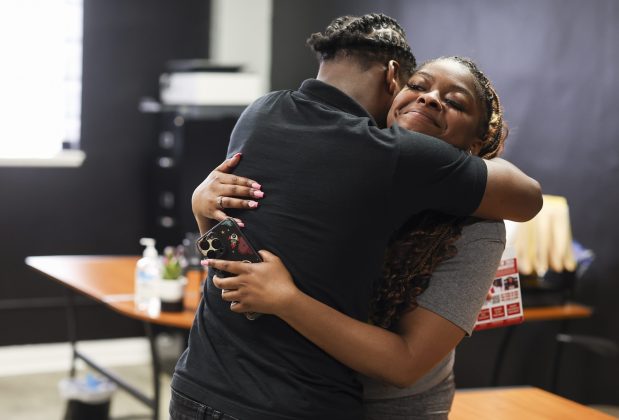
At a recent youth workshop at Perkins’ headquarters on South Ashland Avenue, Rachel Watters, the organization’s project manager, asked a group of four kids to speak to several others about what they needed from the organization.
They, too, highlighted the lack of resources in their neighborhoods, echoing Perkins’ concerns.
“Grants,” said Jaquan Moore, 18. “We need financial stability.”
Watters also asked them what the programming meant to them.
“It’s that backbone and support you need,” said Sanaa Battle, 18. “Like a family that you never had.”


